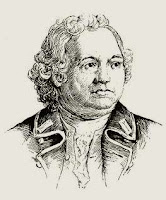How Lincoln Impressed Washington
Under the tacit hierarchy of the New England generals, that would have put Warren under Artemas Ward (considered a captain general) and John Thomas (a lieutenant general), and by seniority at the bottom of all the other major generals in the New England forces.
Of course, Dr. Warren never took up that commission. He went onto the battlefield in Charlestown, fought as a volunteer, and died.
Despite that precedent, the clerk of the provincial congress, Benjamin Lincoln of Hingham, also wanted to be a general.
Lincoln had been a lieutenant colonel in the Suffolk County militia before the war. In January 1776, the General Court promoted him to militia major general. His main mission was coastal defense, and he reported on that situation to John Adams in August.
At the same time, Lincoln was positioning himself for a commission in the Continental Army. Gen. Ward wasn’t in the best of health and had lost the support of Gen. George Washington and other important figures. Even Joseph Ward, a relative and aide, told Adams that Gen. Ward was “under the great disadvantage of bad health” and couldn’t show his men that he was “superior to difficulties dangers or misfortunes” as the best generals did.
Joseph Ward wrote:
If a few old Colonels should resign it might be no disadvantage to the Service; very few of them take much pains to qualify themselves for higher command; they want education, knowledge of the World and genuine ambition to make them shine as Generals. I apprehend that Benjamin Lincoln Esqr. (now a Major General in the militia) is a good man for a Brigadire General; he has never been a Continental Officer nor had much experience, but he is a man of abilities and appears to me to have a good mind. I am well informed that he would like to engage in the Service.That fall, the Massachusetts General Court raised short-term troops to defend New York. After James Warren declined command, Lincoln became the state major general in charge of that force. They weren’t involved in the big battles and came home in November.
That service was enough to impress Gen. Washington, however. When Massachusetts raised more troops for the winter of 1777 and put Lincoln in charge of them, the commander-in-chief wrote to him:
Give me leave Sir to assure you that this Appointment gives me the highest Satisfaction as the proofs you exhibited of your Zeal for the Service, in the preceding part of this Campaign convinces me, that the command could not have devolved upon a more deserving Officer.Lincoln served under Gen. William Heath in that winter, besieging a British position near Kingsbridge. Heath’s push fizzled out, further lowering him in Washington’s eyes.
Back in July 1775, when Washington had arrived in Massachusetts, the province’s generals were Ward, Thomas, and Heath. Now Ward was about to resign, Thomas was dead, and Heath was doomed never to have a combat command again. Instead, Washington recommended the Continental Congress consider Benjamin Lincoln as “worthy of your Notice in the Continental Line.”
Lincoln thus became the newest major general in the Continental Army in March 1777. And he retained Washington’s esteem even after having to surrender Charleston to the Crown in May 1780. He also became the U.S. of A.’s first Secretary of War under the Confederation Congress.
On the afternoon of Sunday, 8 December, Robert J. Allison will speak to the Hingham Historical Society on “From Hingham to Yorktown: The Military Campaigns of General Benjamin Lincoln.” You can purchase tickets to attend that talk or view online through this page.



